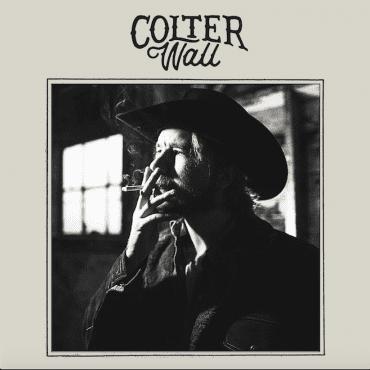Colter Wall finds his voice on his self-titled debut

Colter Wall’s eponymous debut full-length album begins as all good country records do: a great story. In true Johnny Cash fashion, Wall recounts his run in with a police officer in his hometown of Swift Current, Saskatchewan (nicknamed Speedy Creek) in the track “Thirteen Silver Dollars”. Wall establishes his voice from the start, with the voice of a weary old folk singer mixed with the swagger of the legends of outlaw country such as Waylon Jennings. With the impressive Imaginary Appalachia EP under his belt, Wall’s first record is highly anticipated by his growing legion of followers.
While established americana acts such as Sturgill Simpson and Cale Tyson opt for lush production inspired by the great soul artists of Motown fame, Wall arms himself with only an acoustic guitar and is backed by light percussion and pedal steel. Superstar Producer Dave Cobb has proven his knack for capturing the voice of an artist in his work with chart-toppers such as Jason Isbell and the aforementioned Simpson, this is no doubt the case here, and the sonic sparseness employed by Cobb highlights Wall’s greatest talent: his lyricism.
On the record’s second single “Kate McCannon” Wall sings, “Well the raven is a wicked bird / his wings are black as sin / and he floats outside my prison window, mocking those within / And he sings to me real low / ‘it’s hell to where you go.'” This sort of outlaw poetry is Wall’s bread and butter, spinning tale after tale of drinking, women and ramblin’. While many artists in the past have attempted to join the ranks of outlaw country’s finests, few do so with an air of authenticity. This is the rare quality found in Wall’s music. If Luke Bryan and Florida Georgia Line ever caused Waylon and Merle to roll in their graves, Colter Wall is helping them rest easy.
“You Look To Yours” is a Haggard-esque ballad about a woman not willing to leave her pride in the barroom to spend the night. The characters in these 11 songs are never cartoonish, and always feel familiar, their humanity is at the core of Wall’s authenticity. His words paint vivid pictures of the world of Speedy Creek and it’s inhabitants. From Bob Dylan to Townes Van Zandt, this vivid imagery is the mark of all great songwriters.
The album closer “Bald Butte” is a worthy closer to a flawless record. It tells the story of several outlaw cowboys in the prairies of Saskatchewan, running from the law in the midst of antebellum north America. The final verse echoes the first “Bald Butte Bald Butte / so lofty and so high / carry me to Bald Butte where the plains wrap ’round the sky / you can dig a hole in Bald Butte when I die.” These lyrics are a wish of both Wall and the men in his song, this sort of meta songwriting is astounding coming from the pen of a 21 year old man, and serves as a sign of the many great songs in this young artist’s future.
Country fans find themselves directly in the middle of a revival, perhaps even a revolution. After a decade of texas-frat-house-party-country poisoning the airwaves, artists such as Chris Stapleton and Jason Isbell are receiving getting well-deserved attention, opening a floodgate of honky-tonk traditionalists. Just as with the mid-aughts folk boom helmed by the likes of Mumford & Sons, it can be difficult to navigate the musical waters and delineate between the true artists and the lemmings simply leaping to the next trend. With this record, Wall firmly establishes himself as a member of the former. With a sound that celebrates the past while adding an entirely individual spin that sets him apart from the ever-growing crowd. While many artists spend two albums finding their voice, it seems Wall was born with his, and if this record is any indication, it has a lot more to say.




